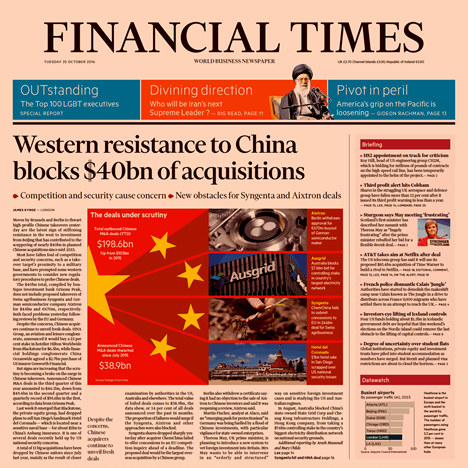06.12.2016 | West resists Chinese takeover bids: the analyst’s view
Martin Fischer, Analyst at Alaco, quoted in a Financial Times front page story on moves to block Chinese takeovers of western companies.

Western resistance to China blocks $40bn of acquisitions
Competition and security cause concern New obstacles for Syngenta and Aixtron deals
JAMES KYNGE — LONDON, FINANCIAL TIMES
Moves by Brussels and Berlin to thwart high-profile Chinese takeovers yesterday are the latest sign of stiffening resistance in the west to investment from Beijing that has contributed to the scuppering of nearly $40bn in planned Chinese acquisitions since mid-2015.
Most have fallen foul of competition and security concerns, such as a takeover target’s proximity to a military base, and have prompted some western governments to consider new regulatory procedures to probe Chinese deals.
The $40bn total, compiled by boutique investment bank Grisons Peak, does not include proposed takeovers of Swiss agribusiness Syngenta and German semiconductor company Aixtron for $44bn and €670m, respectively. Both faced problems yesterday following reviews by the EU and Germany.
Despite the concerns, Chinese acquirers continue to unveil fresh deals. HNA Group, an aviation and leisure conglomerate, announced it would buy a 25 per cent stake in hotelier Hilton Worldwide from Blackstone for $6.5bn, while financial holdings conglomerate China Oceanwide agreed a $2.7bn purchase of US insurer Genworth Financial.
But signs are increasing that the scrutiny is becoming a brake on the surge in Chinese takeovers. Announced Chinese M&A deals in the third quarter of this year amounted to $46.1bn, down from $49.4bn in the second quarter and a quarterly record of $95.6bn in the first, according to data from Grisons Peak.
Last week it emerged that Blackstone, the private equity group, had dropped plans to sell San Diego’s landmark Hotel del Coronado — which is located near a sensitive naval base — for about $1bn to China’s Anbang Insurance. It is one of several deals recently held up by US national security concerns.
A total of 11 big acquisitions have been dropped by Chinese suitors since July last year, mainly as the result of closer examination by authorities in the US, Australia and elsewhere. The total value of foiled deals comes to $38.9bn, the data show, or 14 per cent of all deals announced over the past 16 months. The proportion of failures would surge if the Syngenta, Aixtron and other approaches were also blocked.
Syngenta shares dropped sharply yesterday after acquirer ChemChina failed to offer concessions to an EU competition inquiry ahead of a deadline. The proposed deal would be the largest overseas acquisition by a Chinese group.
Berlin also withdrew a certificate saying it had no objection to the sale of Aixtron to Chinese investors and said it was reopening a review, Aixtron said.
Martin Fischer, analyst at Alaco, said an “emerging push for protectionism” in Germany was being fuelled by a flood of Chinese investments, with particular vigilance for state-owned enterprises.
Theresa May, UK prime minister, is planning to introduce a new system to vet foreign investment into Britain. Mrs May wants to be able to intervene in an “orderly and structured” way on sensitive foreign investment cases and is studying the US and Australian regimes.
In August, Australia blocked China’s state-owned State Grid Corp and Cheung Kong Infrastructure Holdings, a Hong Kong company, from taking a $7.6bn controlling stake in the country’s biggest electricity distribution network on national security grounds.
Additional reporting by Arash Massoudi and Mary Childs
(This is the text of a Financial Times front page story, published on 25 October, 2016)
Next > < Prev